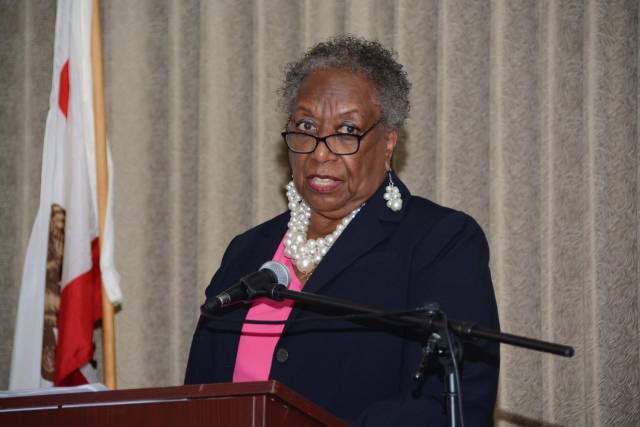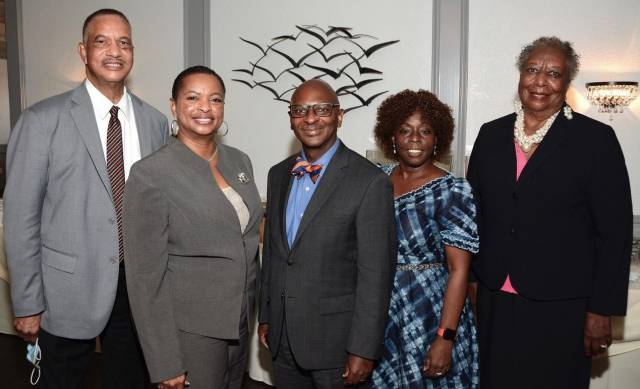You are here
Panel Takes a Personal Approach to Alleviating COVID-19 Vaccine Concerns Among African Americans
The California Association of African American Superintendents and Administrators (CAAASA) hosted a successful COVID-19 vaccine panel discussion entitled Vaccine Hesitancy: Understanding the Science and Getting People to Trust It during its annual Round Up of Educational Leaders in September.
Although CAAASA’s primary focus is education, the organization has been at the forefront of numerous issues impacting the health of the African American community. This panel was part of CAAASA’s ongoing efforts to increase COVID-19 vaccine awareness and uptake among African Americans, with support from the CDC Foundation through the Partnering for Vaccine Equity program.
One speaker, philanthropist and educator Lillie Tyson Head, drew on her very personal connection to a painful chapter of history in order to emphasize the importance of vaccination.
“My presence here is paying homage to the sacrifices and the memories of the 623 plus African American men who were grievously wronged by the U.S. Public Health Service syphilis (USPS) experiment at Tuskegee and Macon County Alabama 1932–1972,” said Tyson Head. “My father, Freddie Lee Tyson, was one of them.”
The USPHS Syphilis Study, known at the time as the “Tuskegee Study of Untreated Syphilis in the Negro Male,” began in 1932 with the goal of following the full progression of the disease. Initially, 600 black men were recruited from rural Alabama for the study, 399 of them had latent syphilis. They were never given a diagnosis or treatment for their condition over the course of the 40-year study, even though penicillin became widely available as an effective treatment for syphilis in 1945.
The study was shut down in 1972 after whistleblowers revealed how unethical and inhumane it was. For many of the men, it was too late—by the time the study was ended, 28 of the men had already died of syphilis and over 100 had died from the devastating and preventable complications of the disease.
Ms. Tyson Head serves as the president of the Virginia-based, Voices for Our Fathers Legacy Foundation, a nonprofit organization founded by the descendants of the men in the study. She acknowledged that this study is often cited as one of the reasons for the distrust many in the black community feel about COVID-19 vaccines today.
“People, particularly in the African American communities, distrust certain medical treatment and medical research. And they are using this study as reason for hesitating getting vaccinated, or refusing to get vaccinated at all,” said Tyson Head. “I am deeply saddened when I hear or read about their reasoning.”
In her speech, Ms. Tyson Head spoke about the biomedical research reforms that have been enacted since the study was exposed. She also drew a sharp contrast between this historic injustice and the rollout of the COVID-19 vaccines.
“The study should not be considered as a reason to hesitate or not to get vaccinated. There is no comparison. The fact of it is that these men were denied treatment,” said Tyson Head. “How fortunate and blessed we are to know about the types of COVID vaccines that are available today. Why then should we deny ourselves from getting vaccinated?”
CAAASA Executive Director Dwight Bonds cited Lillie Tyson Head’s powerful speech as one of the highlights of the conference.
“Lillie shared her own story, the history of the study and what her father went through as a victim of that study. Even with that own personal history, she still was an advocate of the COVID vaccine,” Bonds said. “Her ability to educate and speak on the differences between that study and what was happening with the COVID vaccination needed to be heard.”
Tyson Head went on to ask those who are hesitant about vaccination to seek out information from reliable sources and closed her remarks with a reminder of just how much our individual health is dependent on the health of those around us. “Today, the best that we can do to move from this COVID pandemic is to get vaccinated. We desperately need each other to be protected and stay well. I need you, to be protected. And you need me, to be protected,” she said.
Her words were met with a standing ovation from the crowd.
Funding for this effort is made possible through a subaward from the CDC Foundation and is part of the Centers for Disease Control and Prevention (CDC) of the U.S. Department of Health and Human Services (HHS) financial assistance award totaling $25,660,048 with 100 percent funding from CDC/HHS. The contents are those of the author(s) and do not necessarily represent the official views of, nor an endorsement by, CDC/HHS or the U.S. Government.


